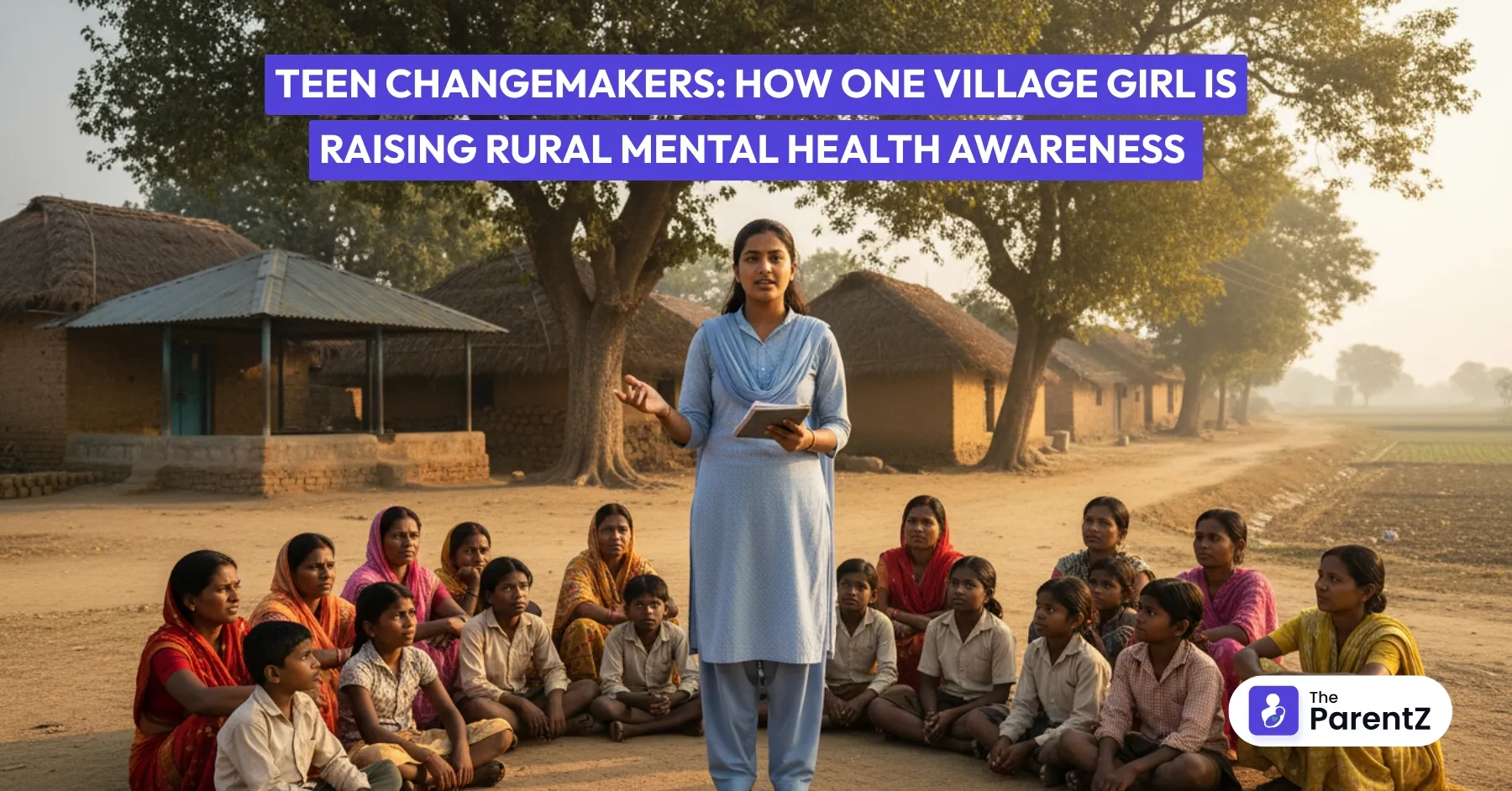If you’ve ever felt proud watching young people do something meaningful, this story will stay in your heart. In many rural parts of India, mental health remains a topic nobody wants to talk about. It’s often brushed off as weakness or something to hide. But one teenage girl is proving that change doesn’t always need massive funds or fame; sometimes it starts with a simple question: “How are you, really?”
Meet 16-year-old Parishi Dua, a student from Dubai. Through her initiative called Thrive Hub, Parishi is working to spread awareness about mental well-being in villages where silence used to be the norm. Partnering with the KCS Foundation India, she aims to help young people and teachers understand emotions, manage stress, and support one another.
What makes this special is that Parishi isn’t just giving lectures or handing out pamphlets. Thrive Hub focuses on real human connection. It’s about building trust within these communities so people can speak freely about what they’re feeling, something that rarely happens in rural areas.
A Spark That Started a Movement
Parishi created Thrive Hub to build resilience, not dependency. Her model includes four pillars: Awareness, Support, Health, and Action, taught over a 15-hour, four-week program. It’s not just students who participate; teachers and community members do too. Together, they learn to talk about stress, relationships, and self-care.
Rather than bringing in outside experts and leaving, Thrive Hub trains local facilitators (teachers or volunteers) who then mentor around 50 people each. This “Train-the-Trainer” approach means that the knowledge spreads like ripples in water. One person’s learning becomes many people's healing.
So far, more than 3,500 students in Bihar have gone through this program. Teachers say the change is visible. Children now talk about their feelings openly, and classrooms have become friendlier and calmer. It is a huge shift in a culture where emotions were once locked away.
Encouraged by these results, Parishi expanded her work this year with the Maanawta Foundation in Ghaziabad, reaching five schools in Uttar Pradesh. Emotional education now has a space in classrooms, along with math and science. As Dr. Gautam Kumar from KCS Foundation says, Thrive Hub’s approach works because it turns awareness into action and talk into real change.
What Parents Can Learn
Many parents might be wondering what this story means for them. It’s easy to think that such a change is only for activists or social workers. But the truth is, every parent can create their own “Thrive Hub” at home. It just starts with listening.
Children today face pressures we never knew at their age, like school stress, social comparison, loneliness, and fear of failing. Yet, most of them don’t always have a safe space to talk about it. When we, as parents, make home a place where they can share their feelings without judgment, we’re already making a difference as powerful as Parishi’s work.
You don’t need a structured program or an NGO partnership to start. You just need patience and presence. Here are a few ways parents can take inspiration from this story:
- Start the conversation early: Ask your child how they’re really feeling, not just how their day was.
- Normalize emotions: Let them know it’s okay to feel sad, angry, or confused sometimes.
- Be a steady listener: Instead of rushing to solve everything, sometimes just hearing them out helps the most.
- Encourage empathy: Share stories like Parishi’s so your kids see how compassion and small actions can change lives.
- Model self-care: When kids see parents taking breaks and managing stress calmly, they learn to do the same.
Parenting isn’t about fixing every problem our children face. It’s about giving them the emotional tools and confidence to handle life’s ups and downs.
A Ripple Effect of Empathy
The most beautiful part of Parishi’s story is how one person’s kindness created waves of awareness across entire communities. In villages once silent about mental struggles, conversations are beginning to bloom. Teachers talk about emotional health, children guide their friends, and families slowly learn that asking for help is not shameful; it’s smart.
This story reminds us that young people don’t need age or authority to lead change. All they need is care, clarity, and courage; values they learn first at home. When parents encourage empathy, curiosity, and the will to help others, they raise changemakers who don’t wait for the world to improve; they start improving it themselves.
Conclusion
Every parent dreams of raising strong, happy children. But strength doesn’t come from silence or pressure; it comes from openness, kindness, and emotional balance. When families talk freely about stress and mental health, kids grow stronger on the inside.
Stories like Parishi’s show what happens when empathy becomes part of education and parenting. It builds a kinder, more resilient generation; one that believes caring for others is not extra work but a way of living.
So maybe today, after reading this, all we need to do is take one small step; ask our children how they’re feeling, really listen, and remind them that kindness can go far beyond their own world. One conversation at a time, just like Parishi, we too can plant seeds for a more compassionate tomorrow.





Be the first one to comment on this story.